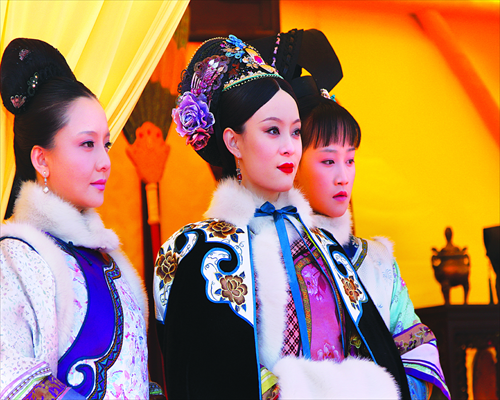Desperate concubines

Popular costume drama 'Legend of Zhen Huan' to air in the US
The most popular Chinese TV opera series of 2012 would undoubtedly be Legend of Zhen Huan, which depicts a fictional power struggle between the concubines of an emperor during the Qing Dynasty (1644-1911). The red hot TV drama not only swept the Chinese mainland, Taiwan and some Southeast Asian countries like Singapore and Malaysia, but it is now marching into the US market.
"It is expected to be broadcast on several US television stations in about six months," said Zheng Xiaolong, director of the show. As a veteran TV director in the country, Zheng's other works include Desire (1990, Zheng was the producer), A Native of Beijing in New York (1996), and Golden Marriage (2006).
"The US company watched Legend of Zhen Huan with English captions and were satisfied with it," Zheng told the Global Times in a phone interview, but he refused to disclose the name of the US company or the local television stations that will broadcast the show.
"They will re-edit the opera into six episodes, each of which will last from 90 minutes to two hours, and some new music will be added," said Zheng.
Power struggles
As a 76-episode drama, women take the lead roles and deliver the utmost of intrigue and scheming among the concubines of the emperor in ancient China. In the opera, Zhen Huan, a concubine played by famous Chinese actress Sun Li, beats all others and even the empress with her wisdom and courage, finally rising to the top position that a woman can reach in the ancient imperial palace.
Actually one reason the show was so hot in China last year is its delicately designed plot that greatly stirred up the audience's curiosity about the power struggle between those concubines.
A famous and beautiful cast of actresses, fancy costumes reflecting a certain period of old China, and an addictive storyline greatly contributed to the show's popularity among Chinese audiences. But to a US audience, the story will come from a completely different cultural background, and domestic producers are still anxious to find out how Legend of Zhen Huan will be received.
Director Zheng is certainly confident: "China has so many ancient costume TV operas, but none of them have been as popular as Legend of Zhen Huan," he said.
Besides the good story and skilled acting, Zheng attributed its success to the righteous historic values presented in the opera. "It is not a simple ancient love or idol story. It reflects the cruelty of feudal society including a tragic end for almost everyone in the opera including the emperor himself (who was cheated by his concubine and raged to death)," said Zheng.
"Through presenting the ruthless power struggle in the imperial palace during ancient China, the opera does not just criticize the feudal system, but also issues a warning for the current era," he further analyzed.
Foreign reaction
Legend of Zhen Huan was actually already broadcast in the US last year, but was limited to some local Chinese language television stations, according to Cao Ping, producer of the opera.
"This time we will not be involved in its reproduction by the US company since we are not familiar with the viewing habits of foreign audiences," said Cao.
It remains to be seen how much a favorite among Chinese viewers will be accepted by foreign audiences.
"I have never heard of this opera, and I think most Americans probably will not know or care too much," said Anna Hill, an American who now works for a media company in Beijing.
On the website asianfanatics - a professional and comprehensive forum on Asian television shows where foreign audiences gather - discussions and downloads about Legend of Zhen Huan are few. But some who already watch the show have recommended it on the forum.
"(It was) very popular in the Chinese mainland in 2012. Very worth watching, although it is historically inaccurate," said Yimi, a member of the forum.
Export barriers
Legend of Zhen Huan faces many hurdles ahead. In the foreign market, Chinese TV dramas may arouse sympathy among some Asian people for their similar cultural background. But for other foreigners with completely different cultural backgrounds, they bring in more strangeness than recognition. Furthermore, the translation may erase some traditional Chinese culture elements and undermine its historic significance.
In Legend of Zhen Huan, the biting dialogue is a highlight, with some lines having become catchy symbols of the show. For example, "Jian ren jiu shi jiao qing," spoken by the powerful concubine Hua, has become a popular phrase now. In English, it literally means "bitches are hypocrites."
Limited by its translation, the depth of its original meaning is not understood, and the tones and feelings expressed by the speaker fail to be delivered to the audience.
There are many such examples in Legend of Zhen Huan, especially when it comes to the stories that involve so many different titles in a hierarchical society. "As to titles for different concubines like daying, changzai, pin and fei, maybe they can translate these into modern words, or even simplify them if they are too complicated to translate," said Zui Xiaoqi who has four years of experience captioning for English language operas.
"After all, people mostly want to know the stories, and it's unrealistic to expect American audiences to understand the rules of the royal family in ancient China through just one TV opera," said Zui.